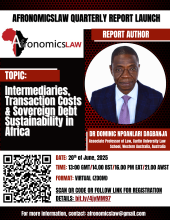Sovereign Debt News Update No. 144: The Road to Recovery - Zambia's Progress and the Path Forward with the IMF
In conclusion, Zambia's journey toward economic recovery, guided in part by its IMF-supported programme, has been marked by both notable achievements and persistent challenges. The "broadly satisfactory" performance and positive forecasts from institutions like Moody's underscore the country's commitment to fiscal and structural reforms, with important milestones already achieved in debt restructuring and economic stabilization. However, the path forward requires unwavering dedication, particularly in addressing persistent issues such as overdue tax revenues and delayed structural reforms. By maintaining fiscal discipline, especially in the lead-up to the 2026 elections, and continuing to implement the ambitious reforms outlined by the IMF, Zambia can strengthen its economic resilience and transform its cautious optimism into tangible, long-term prosperity. The successful finalization of all debt-restructuring agreements in a transparent manner will be the final and critical step in cementing a stable foundation for sustained inclusive growth.
